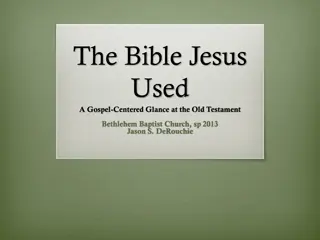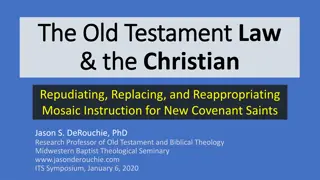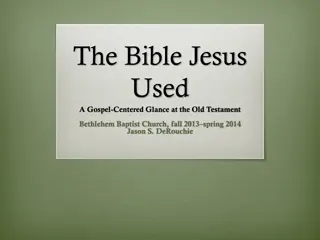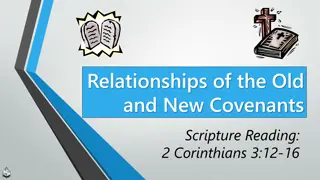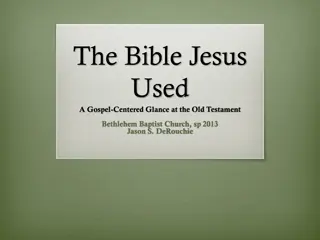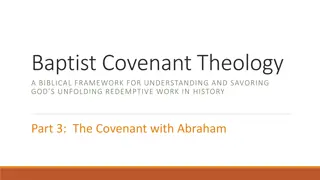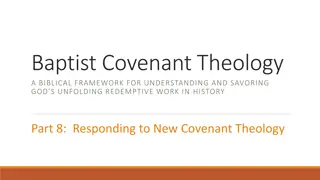
Understanding the Role of Old Testament Laws for New Covenant Christians
Explore the relevance of Old Testament laws for Christians today through an insightful discussion on the connection between moral principles from the Old and New Testaments, shedding light on the importance of timeless moral values for believers of all ages.
Uploaded on | 0 Views
Download Presentation

Please find below an Image/Link to download the presentation.
The content on the website is provided AS IS for your information and personal use only. It may not be sold, licensed, or shared on other websites without obtaining consent from the author. If you encounter any issues during the download, it is possible that the publisher has removed the file from their server.
You are allowed to download the files provided on this website for personal or commercial use, subject to the condition that they are used lawfully. All files are the property of their respective owners.
The content on the website is provided AS IS for your information and personal use only. It may not be sold, licensed, or shared on other websites without obtaining consent from the author.
E N D
Presentation Transcript
New Covenant Theology
Questions Raised by New Covenant Theology
Questions Raised by New Covenant Theology Are the laws and commandments given in the Old Testament binding on New Covenant Christians today?
Are OT Laws Binding on Christians Today? (Review) Last week: I began by reminding you that the Law of Moses (including The Ten Commandments) was designed to regulate the people of Israel living under the Old Covenant. We then briefly reviewed a number of New Testament passages (Hebrews 8:6-13 cf. Hebrews 7:12; Galatians 3:15- 25; Ephesians 2:14-16) which teach us that the Law of Moses ended with the death of Christ so that we can now say, along with the apostle Paul, that we are no longer under the OT Jewish law, but are now under the law of Christ instead (1Corinthians 9:20-21). We then observed that from time to time the Apostle Paul (and other New Testament writers) seem to cite Old Testament Laws as though they are still applicable to the New Covenant Christians. And so we raised the question: Why would these NT writers teach that us that the Law of Moses has ended and no longer applies to us and then turn around and cite OT laws as though they still do apply to us?
Are OT Laws Binding on Christians Today? (Review) Last week: Here is how I answered that question: I began by establishing that there are absolute moral principles grounded in the holiness of God Himself which apply to all men in all ages we are to be holy as He is holy (Leviticus 19:2 cf. 1 Peter 1:16) I then said that I believe these moral principles are best summarized in what Jesus called the two greatest commandments: to love God and to love our neighbor (Matthew 22:37-40) Because all men in all ages are responsible to obey these moral principles, they are included in both the Law of Moses and the Law of Christ. Therefore, it makes sense that when NT writers refer to any of these timeless moral principles in the giving of Christ s Law, they might, on occasion, cite places where those same timeless moral principles are found and explained in the OT. And so we then looked at three NT examples where Paul does this: Ephesians 6:1-3; Romans 13:9-10; 1Cor. 14:33-34
Are OT Laws Binding on Christians Today? (Review) This week: As a follow-up to our discussion last week concerning the absolute moral principles that apply to all men in all ages, I would like to take a somewhat in-depth look at a passage where Paul shows that even men who have been given no external law are still held accountable to those moral principles. Then next week: I would then like to look at a few more NT examples (starting with the second half of the Sermon on the Mount in Matthew 5:17-48) where OT laws are cited and then reapplied, sometimes with an upgrade or modification.
The Law Written on the Heart (Romans 2:11-16) God shows no partiality. 12For all who have sinned without the law will also perish without the law, and all who have sinned under the law will be judged by the law. 13For it is not the hearers of the law who are righteous before God, but the doers of the law who will be justified. 14For when Gentiles, who do not have the law, by nature do what the law requires, they are a law to themselves, even though they do not have the law. 15They show that the work of the law is written on their hearts, while their conscience also bears witness, and their conflicting thoughts accuse or even excuse them 16on that day when, according to my gospel, God judges the secrets of men by Christ Jesus.
The Law Written on the Heart (Romans 2:11-16) Let s start by putting this passage in context: The book of Romans was a letter Paul wrote to the Christians living in Rome (Romans 1:7), whom he had plans to visit in the near future (see Romans 1:10-15; 15:19-24). One of Paul s purposes in writing this letter was to set forth the gospel (i.e. good news) of salvation by faith (Romans 1:16-17). However, before giving the good news of salvation, Paul spends most of the first three chapters of Romans (Romans 1:18 3:20) giving the bad news that all men, Jews and Gentiles alike, are sinners deserving of condemnation at the coming Day of Judgment. The bad news given in Romans 2:11-16 is that even those people who have never heard God s law, will still be condemned by the inner thoughts of their own hearts on the Day of Judgment!
The Law Written on the Heart (Romans 2:11-13) God shows no partiality. 12 For all who have sinned without the law will also perish without the law, and all who have sinned under the law will be judged by the law. 13 For it is not the hearers of the law who are righteous before God, but the doers of the law who will be justified. We see in verse 11 that God as a just judge: God is impartial he doesn t show favoritism. God s impartiality is demonstrated by the fact that he will condemn anyone who sins against Him whether they be: Gentiles who have not had the privilege of hearing his law Or even Jews who have had the that privilege of hearing his law. Why? Because in order to be saved (i.e. put in right standing with God), it is not enough to hear the law. You must do everything that the law commands.
The Law Written on the Heart (Romans 2:14) 14 For when Gentiles, who do not have the law, by nature do what the law requires, they are a law to themselves, even though they do not have the law. So how is it that God can condemn the Gentiles for not doing what the Law says when he s never given them His law? Is it fair to condemn someone for breaking a rule that they didn t know about? This verse tells us that even though the Gentiles had never had God s law proclaimed to them or written out for them (like the Jews had), they show by their behavior that they do have a knowledge of God s moral demands. How so? There was, in Paul s day, a widespread Greek tradition to the effect that all human beings possess an unwritten or natural law an innate moral sense of right and wrong. (see Douglas Moo s commentary on Romans, p.150 fn. 34).
The Law Written on the Heart (Romans 2:14) 14 For when Gentiles, who do not have the law, by nature do what the law requires, they are a law to themselves, even though they do not have the law. We see here that Paul affirms this idea (that men have an innate moral sense of right and wrong) when he tells us that Gentiles do what the law requires through a natural, inborn capacity. Or, as the NLT translates this verse: Even Gentiles, who do not have God's written law, show that they know his law when they instinctively obey it, even without having heard it. Paul s point is that Gentiles outside of Christ regularly obey their parents refrain from murder and robbery, and so on. (Doug Moo, p.150) And when men recognize and do the things that the law says are right and good, they show that they do, in fact, have an innate knowledge of God s righteous requirements. Therefore it is just for God to hold them accountable when they fail to meet these righteous requirements.
The Law Written on the Heart (Romans 2:15-16) 15 They show that the work of the law is written on their hearts, while their conscience also bears witness, and their conflicting thoughts accuse or even excuse them 16 on that day when, according to my gospel, God judges the secrets of men by Christ Jesus. Verse 15 describes the Gentile s instinctive knowledge of God s moral requirements as the law is written on their hearts [i.e. their innermost thoughts]. Paul then goes on to tell us howthat law operates within their heart : It operates through their conscience , so that as they evaluate their own thoughts and behaviors they will often judge their own behavior as: Wrong (and thus will accuse themselves) Or perhaps right in some cases (and thus will even excuse themselves in certain situations). Paul then tells us that those innermost thoughts, where they condemn themselves for wrong behavior, will serve as the basis for their condemnation in the Day of Judgment.
The Law Written on the Heart (Romans 2:15-16) 15 They show that the work of the law is written on their hearts, while their conscience also bears witness, and their conflicting thoughts accuse or even excuse them 16 on that day when, according to my gospel, God judges the secrets of men by Christ Jesus. Some points of clarification on this verse: Paul is not claiming here that these Gentiles have perfect knowledge of God s Law. Our conscience, like everything else, has been corrupted by the Fall, which is why in other passages Paul can say things like : The consciences of unbelievers are defiled (Titus 1:15) Evil people can eventually destroy their conscience to the point where it becomes seared as with a hot iron (1 Timothy 4:2 - NIV). Paul s only point in this passage is that people who do wrong know better even in the absence of law and that knowledge will be the basis of their condemnation on the Day of Judgment.
The Law Written on the Heart (Romans 2:15-16) 15 They show that the work of the law is written on their hearts, while their conscience also bears witness, and their conflicting thoughts accuse or even excuse them 16 on that day when, according to my gospel, God judges the secrets of men by Christ Jesus. Some points of clarification on this verse: Some have noticed the similarity between: The reference in this verse to the law written on their hearts And the prophesy of the New Covenant where the Lord says through Jeremiah, I will put my law within them, and I will write it on their hearts. (Jer. 31:33)
The Law Written on the Heart (Romans 2:15-16) 15 They show that the work of the law is written on their hearts, while their conscience also bears witness, and their conflicting thoughts accuse or even excuse them 16 on that day when, according to my gospel, God judges the secrets of men by Christ Jesus. Some points of clarification on this verse: Though the wording between the passages may appear to be similar, they are referring to two completely different things: The law written on the heart referred to by Jeremiah is talking about the work that God the Holy Spirit does (see 2 Corinthians 3:3) as He regenerates the hearts of the New Covenant believers which, according to the prophesy in Jeremiah, results in them becoming God s people and knowing Him in a saving way (Jeremiah 31:33b-34) In contrastto that, the law written on the heart in this passage (Romans 2:15) refers to the conscience that God puts within man which, apart from the saving work of Christ, will serve as the basis of his condemnation on the Day of Judgment!
The Law Written on the Heart (Romans 2:11-16) In summary: There are a set or moral requirements for which all men will be held accountable even those who have not been privileged to hear God s law in some form. And where God does give us laws, whether in the OT Law of Moses or the NT Law of Christ, we will find that these timeless moral principles are given and explained there. Therefore, it can, at times, be helpful to look at both the OT and NT in order to come to a clear understanding of these timeless moral principles.




